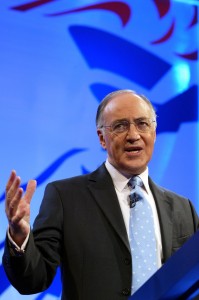The tribute made by Michael Howard, Baron Howard of Lympne, in the House of Lords on 9 September 2011.
My Lords, at this stage in your Lordships’ proceedings, it is not easy to say very much that is new. However, I want to echo in particular the words of the right reverend Prelate who led our prayers and the noble and learned Lord, Lord Judge, in suggesting that our mourning for the longest-reigning monarch in our history should be infused with a spirit of gratitude. For it is we, the people of the United Kingdom and the Commonwealth, who are the beneficiaries of that sense of duty, devotion to service and dedication to the well-being of her subjects about which so many have spoken. She applied those principles in practice in a way that provided inspiration and leadership without ever trespassing for a second into the realm of party politics. In the words of my noble friend Lord Forsyth, she never put a foot wrong.
Much is said these days about soft power: the way in which a country can influence events without necessarily relying on military or even economic clout. It is impossible to exaggerate the extent to which Her Majesty influenced across the world a positive perception of the United Kingdom. She was soft power personified.
Much has been said about the way she put people at ease, and I had the privilege, with my wife, of spending a night at Windsor Castle when I was leader of the Opposition. I was amazed to find in the library the trouble that had been taken to assemble a collection of objects which related to my constituency, Folkestone and Hythe—objects I had known nothing at all about and which were quite remarkable.
Perhaps the most telling example of the way she could put people at ease occurred when a friend of mine who had been subject to much trauma was invited to lunch at the palace, sat next to the Queen and, in the middle of the lunch, froze. The Queen sent for the corgis and, together, they fed the corgis, and my friend unfroze and was able to continue the conversation.
Much has been said about the way Her Majesty was regarded with such enormous respect and admiration far beyond our shores. I finish with one reminiscence. I was in a Caribbean country when a new governor-general had just been appointed, and the local newspaper published an article giving advice to the new governor-general. It said: “You will have many difficult decisions to make, and we suggest that when you are confronted with those decisions, you ask yourself one question: what would Her Majesty do?”
My Lords, we have lost a great monarch, a great friend and, as she described herself, a servant—our country’s greatest and most faithful servant.
